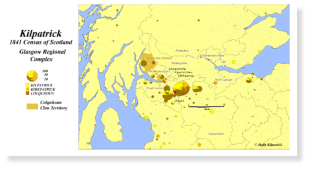



The Kilpatrick Surname Study


© Holly Kilpatrick
Surname Persistence
Once established in a region, surnames typically endure and may even strengthen over time. Historically, mobility was restricted, and individuals with a strong connection to their surroundings tended to remain in place. With natural population growth, a surname would firmly take root in a local area, and any movement or relocation would usually occur over shorter distances. The persistence of surnames can be influenced by various factors. Favorable economic conditions might encourage expansion, while adverse events such as climate change, crop failure, or famine could lead to decline. The 19th century witnessed significant changes due to industrialization and urbanization, resulting in relocations. However, as demonstrated in the previous section, it is often possible to identify historic homelands for surnames, and consequently, families. In both family complexes, there is evidence of limited mobility. In the Glasgow region, it appears that both the Kilpatrick and Colhoun surnames have moved from their traditional homelands. Furthermore, it seems that the Kirkpatrick variant may have emerged. The "cosmopolitan" nature of Glasgow could explain the "prefix confusion" between "Kil" and "Kirk." In Galloway, it seems that the traditional homeland has been maintained, with fewer settlements evident in the immediate surroundings. There is a high degree of consistency in the spelling of surnames. The region's proximity to areas of Norse settlement, like Cumberland, where "Kirk" was more commonly used in place name spellings, suggests a potential connection. However, it is improbable that these Kirkpatricks have a significant link to those in the Glasgow region. One noteworthy presence of the Kilpatrick surname in the area is observed in Wigtownshire and the parishes of Stonykirk and Portpatrick. The town of Portpatrick served as the primary trading port between Scotland and the Ards peninsula.

The Kilpatrick Surname Study


GeoGenealogy













